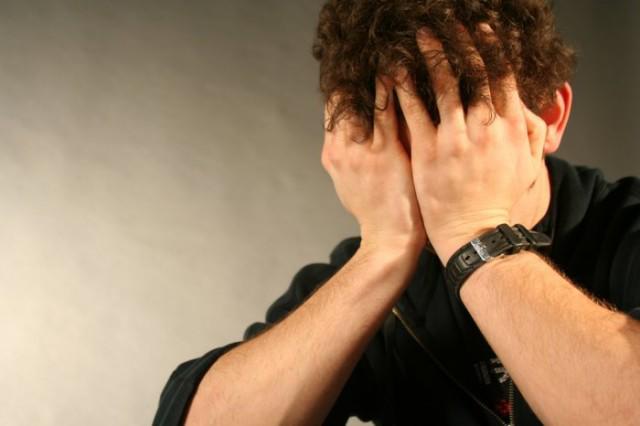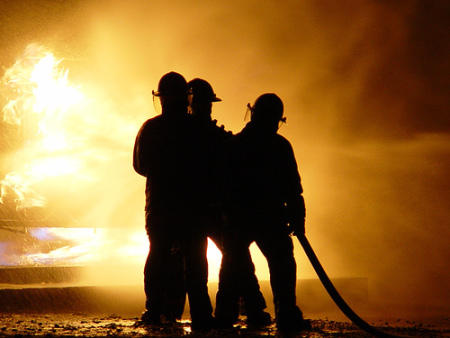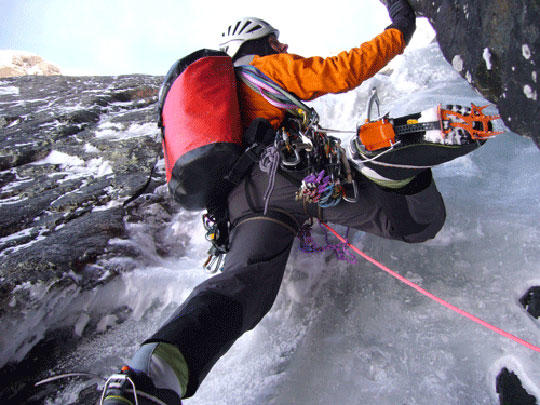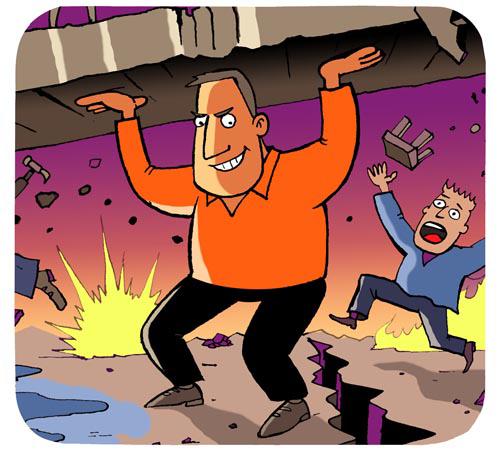Continuing my "psychological notes", I want to pay attention to such suspension aspect as stress. It's not difficult to come to logical conclusion that fear and pain during suspension lead to definite states and reactions which can be called "psychological stress". And even if the suspension is done in the frames of freak-show or enternainment the person in any case will feel anxiety and pain.
To learn this issue better, let's consider the notion of "stress" itself.

STRESS is the physic and psychological state, which arises in response to various extreme effects. Stress is evoked by situations of danger, responsibility, growth, necessity to take quickly an important decision, big intellectual and volitional load, etc.Stress theory was created by G.Selie (1907-1982), canadian biologist and doctor. Per his definition, stress is everything which leads to quick organizm aging or evokes illness. Encyclopedia gives the following stress definition: " A complex of defensive psychological reactions arising in animal's or human's organizm in response to effect of different unfavourable factors". It occurs that stress directly concerns that topic, because during suspension the person experiences physic and psychological loads, connected with fear, pain and their overcoming.
It's not surprising that the topic of stress and it's overcoming interests psychologists for a long time. Various methodics of stress discovering and overcoming of stress situations have been developed, a variety of theories and classifications exist in the field.
But how stress is studied and what the research ia aimed at? at stress research differents modelling ways of stress conditions are widely used - for example, in the laboratory to provide pain irritator (for examle, electrical blow) and observe the adaptation and desadaptation of the organism. These are artifical conditions.
As natural model of emotional stress, affording to research unique, general laws of it's development, we may consider dangerous professions,

extreme sport,

& suspension also.

The notion of "extreme" itself presumes that it's not indifferent to the organizm, moreover, it may evoke in it marginal per some indicators changes, and suspension is subject to this difination.
At influence of extreme factors on a person general symthomsof adaptation are shown, for study of which stress research is oriented. Stress reactions and following stress states, caused by physically and psychologically meaningful effects are the powerful factor, ensuring adaptive person's behavior. Physic adaption is the most perfect and difficult adaptive process.
We'll return to the theme of the previous note and talk about fear.
At sportsmen and suspended fear may be of two types: fear of the real danger and threat to life and health, and ungrounded fear, not connected with real danger, but with extreme anxiety. Ungrounded fear is more ill-favoured in relation to possibility of achieving the best results, as the real danger leaves hope for happy end and affords to take real safe measures.

Fear overcoming ( abitity to act expediently in the fear situation ) doesn't mean it's escape. The task isn't is stopping to feel this emotion, but learn how to realize extent of danger and act on the base of this knowledge, developing special approach to the fear itself. Training in this regard completely eliminates or decreases the negative influence of risk. Sportsmens who often have to pass through extreme situations, and also people who expirienced in bodysuspension, are able to develop skills of the most adequate reactions and most correctly to mobilize their functions in any case. Due to that, fear become less expressed and takes less attention - so adaption occurs.

Also, here the considerable role plays the positive expirience, satisfaction due to accomplished task, raise of self-confidence and belief in one's forces. It all leads to growth of self-trust, which leads to better adaption to a certain difficult situation and difficult situations in whole. Not in vain a lot of clients tell that life hardships move to the second place and attitude to them becomes simpler. It's also confirmed by the fact that majority of clients cope with stress better from time to time, often increasing the difficulty of the task: choosing more painful or subjectively "fearful" pose or increasing hanging time.
Psychological adaption mainly depends on personal motivation, on process governing the direction, activeness and stability in human activity for reaching a definite and conscious result.

Motivated behaviour is the result of 2 factors: personal and situational. Personal factor we understand how motivational personal despositions ( needs, motives, attitudes, values ), and situational - external conditions.
High motivation ( value of the fulfield action and desire to reach the result) helps increasing of mental and physical endurance, achieving of high results and depends from previous expirience, social, personal and cultural traits. Motivotional level depends on purpose choice, ambitions level ( striving to archieve the goal of such complicacy, for which the person considers himself capable), self-estimation.

The higher motivation is, the higher the affectiveness of action is, but till a definite limit. Extremely significant motivation, dependancy a performance result on competition, total inadmissibility of a diny failure may evoke excessive excitement, agitation, anxiety, alertion which is a negative stimulus. Each activity, especially sportive or dangerouse will be succesful only if it occurs on the base of optimal level of emotional excitement for such situation.
Also it's very important to consider relation between motivation extent, real person's possibilities and concrete situation, causing effectiveness or ineffectiveness of actions.
So as individual stress-resistense influences the choice of extremal life-style, the stress influence constantly influences the emotional resistence, fixing and reinforcing the inherent data. Under emotional resistance we understand the individual capabilities of the "extreme person" to keep the high endurance in conditions of strong emotional factors, to ensure effective and directed activity in stress conditions.

As I have inentioed before, fear overcoming and stress-resistance are undestroed as a result of adaption, namely insensivity to any external factors, endurance, trained emotions and their control, i.e. apperance of new skills and qualities. These qualities are manifested in the fact that organizm can be no more damaged psychologically ( speaking of extreme sports, to guarantee full physical safety is impossible) by the factors, to which it has adopted. In wide biological sense it increases the individ's fitness and stability of nervous system, and also prevents organizm's damage.

It's remarkable that increase of resistance to any one risk factors ( for example, fear and pain during suspension, which evoked initial adaption) simultaneously increases resistence to other factors (for example, fear of visit dentist - "I have been suspended on hooks! I should be afraid of nothing!"). This leads, in it's turn, to better adaption and growth self-confidence.
Numerous scientific data and practical observations earnestly evidence the posibility of emotions trainig, which increase stress-resistance, handicap the development of extreme by force and logitude emotional reactions, prevent disturbances of nervous and psychiatric sphere in specific areas of activity ( enclude sport and any others "dangerous" and "stressful" activities) where a lot of stressful situations, which can damage the mind.
In studying of the problem of emotional stress we should know the fact that not every emotional stress causes mind injury. Normal level of emotional stress forms necessary psychological foundation for successful sports and creative activities, as well as to overcome the natural difficulties in different circumstances. Acquiring and fixing adaptation, training your reactions to emotional stimulus, we primarily develop certain qualities of mind and control, which can be useful in life. A lot of people do not realize why actually they love bodysuspension. Regular emotion training and overcoming of such vital and inevitable emotions like fear and anticipation of pain, acquiring new qualities and capabilities, increasing self-esteem and self-confidence, we can achieve more good results in other aspects of life.


